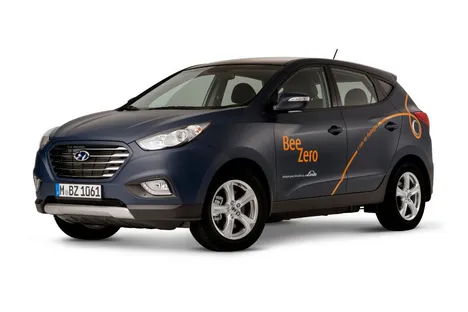Hydrogen Mobility Concept (Cooperation with Linde AG und BeeZero)
Project Completed - Contact: ftm(at)ftm.mw.tum.de
Problem
The project "Hydrogen Mobility Concept" is the first comprehensive experiment, that implements a multi-user concept with fuel cell electric vehicles (FCEV). Linde AG operates a hydrogen powered car sharing system containing 52 FCEVs since 2016. In this context, we study the operation of the FCEVs in the urban environment under real conditions. The complex system is fully integrated in the mobility conext of Munich encouraging innovative multimodal mobility by means of hydrogen powered vehicles.
Launching such a system in the field of individual mobility is a technically and economically challenging venture. However, hydrogen as an energy carrier for individual mobility offers advantages in terms of local zero emissions, fast refuelling and green mobility by obtaining hydrogen from renewable energy sources. The lack of infrastructure is a major limitation for potential users due to the small number of filling stations and their high failure rates. It is therefore necessary to synchronize vehicle and infrastructure development in order to promote the acceptance of hydrogen mobility by users.
Objective
The focus of this project is to investigate the suitability of hydrogen vehicles currently available on the market for everyday mobility needs in Munich. Furthermore, it will be investigated whether it is possible and reasonable to accelerate the introduction of fuel cell technology, for example by expanding the infrastructure.
Implementation
Due to the high vehicle density (currently 52 vehicles in the city area of Munich) and the high intensity of use (up to 3,000 refuelling operations per year), a large number of contact points are created, which allow to investigate the technical behavior, such as vehicle characteristics, refuelling time and reliability of Hydrogen Refueling Stations (HRS). At the same time, hydrogen-powered vehicles can be experienced by the users and user behavior can be analyzed. The project also demonstrates to the automotive industry, that there is acceptance for FCEVs and thus creates an incentive to tackle the FCEV rollout more courageously. Therefore, the project accelerates both the expansion of HRS infrastructure as well as FCEV development.
This project focuses on three main areas in the investigation of the use of hydrogen vehicles and their infrastructure under real conditions: On the one hand, an analysis of the vehicle characteristics and a modelling of the longitudinal dynamics is carried out to investigate the suitability and optimisation of the vehicle concept used. The consideration of the hydrogen infrastructure with existing and planned filling stations for the future is the second focus of the research project. The third topic area focuses on the analysis of user behavior in the context of hydrogen mobility and compares different car sharing concepts. Thus, an overall view of this novel mobility concept is given to answer current research questions regarding hydrogen mobility and its future role in the mix of multimodal mobility.
